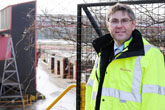

WEST YORKSHIRE: The best business advice I have ever received was from Jonathon Porritt, a former director of Friends of the Earth. He said you have to...
manage the 'triple bottom line': economic, social and environmental factors.
It's an ethos that has become central to our strategy at Marshalls, enabling us to improve our profitability, minimise our impact on the environment and act to improve the lives of workers, their families and local communities.
Businesses have a lot to lose from energy wastage. Smart energy management not only cuts costs but also makes organisations more productive and improves their reputation with customers.
Marshalls embarked on this journey more than four years ago and my only regret is that we didn't act sooner.
Our first step was to get an objective, expert view of where we were wasting energy, and an action plan to tackle it through a Carbon Trust survey.
The sooner you start, the sooner you begin to reap the rewards in terms of lower energy bills, reduced carbon emissions and an enhanced reputation with stakeholders, customers, staff and suppliers.
With energy prices certain to rise, the fact that climate change is a reality and that many companies are struggling to survive and thrive in the current economic downturn, cutting energy bills and carbon all at the same time makes sound business sense.
You'd be surprised how many staff adopt the sustainability cause given the opportunity. We now have drivers competing with each other to see who can drive more efficiently, with help from our carbon-reduction route planning software.
Whatever you do in the environmental domain, it must be genuine and independently certified. Avoid greenwashing at all costs. Too many companies pay lip service to 'green' issues and risk undermining the already fragile consumer confidence in this area of business performance.
In April 2010, the Carbon Reduction Commitment comes into effect which means an increasing number of businesses will be required, by law, to reduce their carbon emissions or pay a fine for non-compliance.
There is talk of some businesses just paying the CRC tariff and continuing to burn CO2.
True, for some that may be more cost-effective for now, but the tariffs will only get steeper. I don't want our business to be operating at the bottom of the carbon league table.
Some of our most important customers - gardeners - are intensely carbon aware, so that would damage our brand. The cost of burning carbon is high in more ways than one.
My best business advice for 2010... sign up for a free carbon survey.